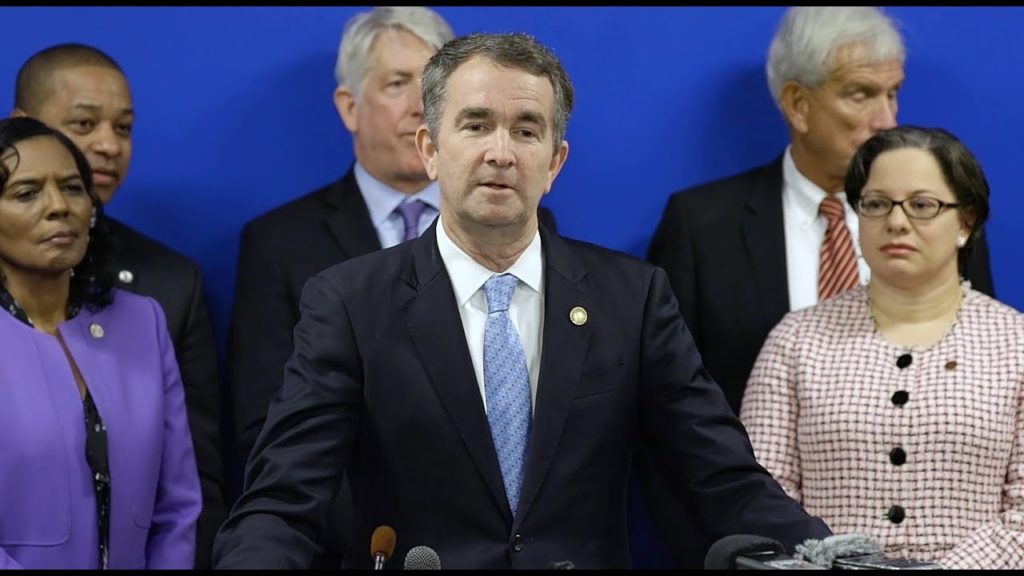On Thursday in Richmond, Democratic leaders announced their support for a sweeping repeal of abortion restrictions in Virginia, including deregulation of third trimester late term abortions up until the moment of birth. The press conference, attended by Governor Ralph Northam, Lieutenant Governor Justin Fairfax, Attorney General Mark Herring, and a host of Democratic lawmakers, touted two pieces of legislation filed by Democratic lawmakers, the Repeal Act and the Reproductive Freedom Act.
The Repeal Act, introduced as HB2491 by Delegate Kathy Tran (D-Springfield), would repeal restrictions on third trimester abortions, allow abortionists to self-certify the necessity of the procedures, eliminate informed consent requirements, repeal health and safety standards for abortion clinics, allow late term abortions to be performed in outpatient clinics, waive ultrasound requirements, and eliminate the 24 hour waiting period for abortions in Virginia, among other provisions.
“I introduced House bill 2491, the repeal law, to lift medically unnecessary and unduly burdensome requirements for women to access abortions in the Commonwealth,” said Tran.
“This bill removes hospital requirements on clinics and providers, laws that mandate informed consent, a combination of mandatory ultrasounds, biased literature, and the 24 hour waiting period, and additional doctor requirements for late term abortions,” Tran continued, describing the provisions of the bill.
Third trimester abortions remain highly unpopular with voters, with just 13% saying the procedure should “generally be legal”, according to nonpartisan polling conducted by Gallup, which noted that trimesters were “still key to U.S. abortion views.”
The Reproductive Freedom Act, introduced by Delegate Charniele Herring (D-Alexandria) as HB2369 in the House, and by Jennifer Boysko (D-Herndon) as SB1637 in the Senate, would establish a “fundamental right” to abortion in the Code of Virginia, prohibiting the Commonwealth from enacting restrictions on abortions, including late term procedures in the third trimester of pregnancy. The measure was backed by Governor Northam during his annual State of the Commonwealth address, in which the governor also called for higher spending, sweeping gun control, and a repeal of Virginia’s law requiring voters show photo ID at the polls.
The Democratic leaders were joined by Amy Hagstrom Miller, President and CEO of Whole Woman’s Health, a chain of abortion clinics currently operating in six states, including one location in Charlottesville, Virginia. Miller’s abortion business was the lead plaintiff in the Supreme Court case Whole Woman’s Health v. Hellerstedt, which overturned certain restrictions applicable to abortion clinics.
“We provide fabulous abortion care and we fight the draconian abortion regulations and restrictions,” said Miller. “As abortion providers, we believe that everybody deserves dignity, deserves respect, and that our patients should be at the center of their own health care decisions.”
“That’s why we fight harmful anti-abortion laws, and that’s why we support legislation like this,” continued Miller, saying that passage of the Repeal Act was the “first step” in the fight to expand abortion in Virginia.
An hour before the press conference, lawmakers defeated the Senate’s version of the Repeal Act in the Committee on Education and Health, introduced by Senator Jennifer McClellan (D-Richmond), on a party line vote, with seven Democrats in support and eight Republicans in opposition.
“So, we continue to fight, and we will be back next year to make sure that the Repeal Act passes,” said McClellan.
At the same committee hearing, Boysko’s Reproductive Freedom Act was also defeated on a party line vote.
Boysko, a former board member of NARAL Pro-Choice Virginia and staunch abortion advocate, said she was disappointed by the failure of her bill.
Following the defeat of the Senate bills, and foreshadowing the likely defeat of the measures in the House this year, Northam, Fairfax, and Herring said it was necessary to elect Democratic majorities in November to repeal restrictions on abortion next session.
“So when can’t change peoples minds, we need to change seats,” said Governor Northam, speaking to the upcoming November elections.
Northam, who is a doctor, worked as a pediatric neurologist prior to being elected governor.
Lieutenant Governor Justin Fairfax, a strong supporter of abortion, echoed the governor’s electoral sentiments.
“Though we had some setbacks today in committee around this legislation, please be on notice that when we come back for our next General Assembly session, it will be a very different outcome, because we will have more allies in the House and the Senate,” added Fairfax, who formerly served as a board member of the Planned Parenthood Metropolitan Washington Action Fund.
“I will continue to bang that gavel for progress,” said Fairfax.
Vowing to be a “brick wall” against restrictions on abortion, Attorney General Mark Herring also called on Virginians to elect a pro-choice Democratic majority, while also noting his work as Attorney General fighting against a twenty-week abortion ban and working to protect funding for Planned Parenthood.
“In 2017, Virginia elected three pro-choice, statewide, state elected officials, fifteen new pro-choice delegates, and this past election, elected three pro-choice congresswomen,” added Herring.
“We need a pro-choice majority in the General Assembly,” Herring continued.
During the 2016-2017 statewide campaign cycle, abortion advocates contributed heavily to Democratic campaigns in hopes of repealing abortion restrictions, donating a combined total of $4,871,584 directly and in-kind to pro-abortion politicians, according to campaign finance reports compiled by VPAP.
While that investment helped elect Democrats to the offices of Governor, Lieutenant Governor, and Attorney General, it stopped short of capturing legislative majorities in the House of Delegates and the state Senate, where Republicans held on to narrow majorities of 51-49 and 21-19, respectively.
Though the rollback of abortion regulations is unlikely to pass this year, due to opposition from Republican lawmakers, that could change following November’s elections.
Watch highlights from the press conference below, in longer form than the summary above.

